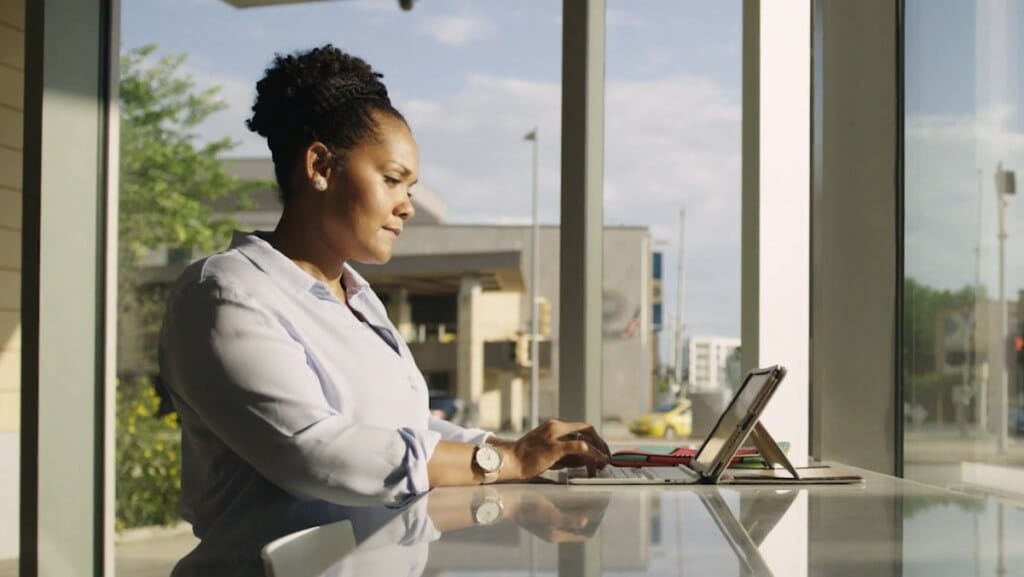UW–Madison Online: Educational access for returning adult students

Like Nicole Knutson, returning adult student Mia Greene (above) took online classes from UW–Madison that helped her achieve academic goals.
For Nicole Knutson, it was never if she would get a college degree, it was when. She loved academics. But after high school, about halfway into her first semester at the University of Wisconsin–Madison in 2008, the Minnesota native withdrew due to mental health challenges.
She went home, tried community college, but left and settled into retail jobs until she had to take medical leave. She was convinced her dream of higher education had died.

Nicole Knutson
Then she learned about UW–Madison Online. In 2020, at age 29, Knutson enrolled in the new program to finish her bachelor’s degree — fully online — while continuing to manage other life commitments. It hasn’t been easy, but she made the Dean’s List her first semester back to college after a 12-year break.
“Nicole is the sort of student we had in mind when we thought about expanding access to the University of Wisconsin–Madison,” says UW–Madison Chancellor Rebecca Blank. “To meet the needs of potential students who want to complete their degree but cannot be a traditional residential student, we launched UW–Madison Online. We’re removing barriers, bringing a sought-after UW–Madison bachelor’s degree to more people.”
In Wisconsin alone, more than 600,000 people have earned some college credit but no degree. This number expands to 5.2 million when including neighboring states (Illinois, Minnesota, Michigan, Indiana and Iowa). UW–Madison Online offers five bachelor’s degrees — with more to come — for people in Wisconsin and around the world who want to finish a degree and advance in their careers while still working and taking care of other obligations.
In addition to increasing access, UW–Madison Online has the potential to drive economic development and improve life outcomes.
Blank adds, “Ultimately, this effort extends the invitation to be a Badger across the state and beyond our borders to nontraditional students. You don’t have to be here with us on campus to acquire a University of Wisconsin–Madison degree, take it into the world and benefit your family and community.”
Expressing the Wisconsin Idea
In 2020, UW–Madison Online launched the first fully online degree, a BS in Personal Finance from the School of Human Ecology. In 2021, the program added bachelor’s degrees from the Wisconsin School of Business in human resources, management and marketing, and an additional degree from the School of Human Ecology in consumer behavior and marketplace studies.
UW–Madison Online continues the tradition of the Wisconsin Idea — a pledge to serve people beyond the boundaries of campus — by leveraging technology and resources to invite those who can’t come to Madison to be a Badger and finish their degree online.
UW–Madison is not new to online education. In the past two decades, the University has offered master’s and doctoral degrees and certificates in online and other flexible formats for working professionals through the Professional Degrees and Certificates program.
The UW–Madison Online degrees are designed for people who have earned an associate degree or have some college credit (a minimum of 12 credit hours) but can’t attend college in person due to work, family, other obligations or obstacles. Courses taught by top-notch UW–Madison instructors accommodate the part-time student, and most students graduate in three to five years. Graduates leave with highly marketable skills and knowledge, ready to meet the needs of employers.
In addition to carrying out the Wisconsin Idea, UW–Madison Online provides online education that:
- Gives Wisconsin residents, including returning adult students and populations who are geographically restricted, access to UW–Madison.
- Provides access to high-quality education, increasing economic opportunity for residents and strengthening the state economy.
- Serves to increase the number of residents earning baccalaureate credentials. Postsecondary degrees can help eliminate income inequality, which is the most significant factor driving poverty in the nation.
“At a time when online education has become more important than ever, we’re leveraging technology and our top-tier faculty and programs to open up the university to more people who are seeking a degree that they can use to build a better future for themselves,” says Blank.
‘I had given up on my dream’
Through her UW–Madison Online experience so far, Knutson has had access to world-class professors, campus resources, enrollment coaches and academic and career advisors to support her.
“I have been pleased with the quality of education I am getting and how the professors are concerned with my success,” she says.
For example, Knutson found her gender and women’s studies course professor particularly caring when she shared her mental health struggles and had to ask for extensions on an assignment. She’s also tapped into resources at the McBurney Disability Resource Center, the UW–Madison office for students with disabilities and classroom accommodations.
And she’s benefitted from getting to know her fellow UW–Madison Online students.
“I was worried because I thought it might be me and a bunch of 18-year-olds,” she says. “But as people were introducing themselves, I found out that there were parents, people with work experience and just people who I considered to be peers. I have enjoyed sharing stories with them.”
Knutson is hoping to graduate from UW–Madison Online in 2024. She’s interested in educating others about financial well-being, and she feels that with a degree in personal finance, she has a lot of career options. She’s thrilled to be in school and optimistic about her future.
She adds, “In my late 20s, I convinced myself that I would never get a degree. I had given up on my dream. I was so hesitant to come back to school because I felt like I was too old and it was past my time, but I am so glad that I did. I see myself becoming the person I always wanted to be.”
Learn more about UW–Madison Online.
Subscribe to Wisconsin Ideas
Want more stories of the Wisconsin Idea in action? Sign-up for our monthly e-newsletter highlighting how Badgers are taking their education and research beyond the boundaries of the classroom to improve lives.




